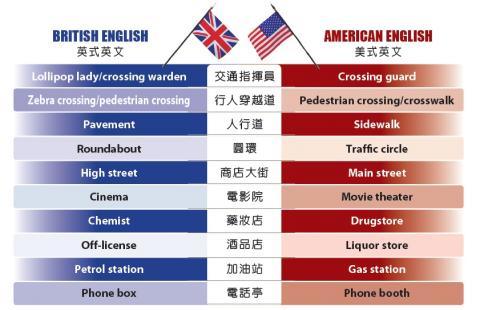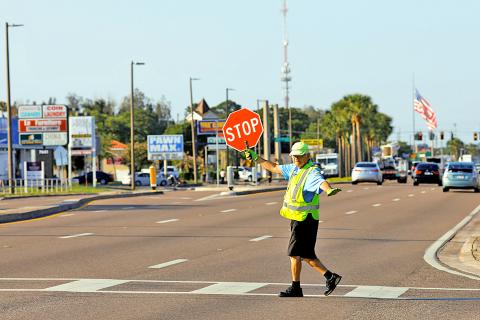It’s possible that few British people have ever heard the term “crossing guards.” They do exist in the UK, it’s just that they are called “crossing wardens” or, more colloquially, “lollipop ladies.” The lollipop refers to the circular stop signs on poles that they typically carry with them to indicate when it is safe, or not, to cross. If the term sounds patronizing, it’s worth remembering the crossing guards are there for the benefit of children. An alternative name is “lollipop woman” — or “lollipop man” if male, of course — but the alliteration in lollipop lady just makes the term sound friendlier.
Lollipop ladies would help children cross the road outside schools, at pedestrian crossings called “zebra crossings” — crosswalks in the US — after their black and white stripes.
There are many different words for objects encountered along the street in American and British English. For a start, in the UK, the schoolchildren would be walking on the pavement, not the sidewalk; on the drive to school, their parents may have had to negotiate roundabouts rather than traffic circles; and they might have passed buildings along the high street — main street in US English — such as cinemas rather than movie theaters, chemists instead of drugstores, off-licenses not liquor stores and petrol stations instead of gas stations. In the past, they may have passed people queuing outside phone boxes (rather than lining up outside phone booths), along the way.

(Paul Cooper, Taipei Times)
聽過「crossing guards」(交通指揮員)一詞的英國人可能很少,但這詞在英國的確存在,只不過是叫做「crossing wardens」(交通管理員),或更口語地稱為「lollipop ladies」(棒棒糖女士)。棒棒糖指的是他們常拿的連著桿子、寫著「stop」的圓形舉牌,用來指引何時可以安全過馬路。如果覺得叫人家「棒棒糖女士」顯得自己好像高高在上,那我們別忘了,交通指揮員在那裡是為了要幫助兒童。另一種說法是叫做「lollipop woman」──若是男性,當然就叫「lollipop man」)──但「lollipop lady」這兩個字所押的「L」頭韻,讓這名稱聽來更和譪可親。
「lollipop ladies」會協助孩子在學校外面過「zebra crossings」(斑馬線)──這行人穿越道因其黑白條紋像斑馬而得名;斑馬線在美國則是叫做「crosswalks」。

Photo: Reuters
照片:路透
很多路上會遇到的事物,在美式和英式英文中的說法並不相同。學童出門,在英國是走在「pavement」(人行道)上,而非美式的「sidewalk」。父母開車去學校的路上,或許得經過「roundabouts」(英式的「圓環」),而非美式的「traffic circle」;也可能經過了「high street」(英式「商店大街」,美國叫「main street」)沿路的建築──例如「cinemas」(英式「電影院」)而非美式的「movie theaters」、「chemists」(英式「藥妝店」)而非美式的「drugstores」、「off-licenses」(英式「酒品店」)而非美式的「liquor stores」,以及「petrol stations」(英式「加油站」)而非美式的「gas stations」。若在以往,或許途中會看到等著打電話的人們,在「phone boxes」(英式「電話亭」)外排隊,而非美式的「phone booths」。
(台北時報林俐凱譯)

William I of Prussia, a passionate painter, often autographed his works with “tormentis pinxit” — “painted in pain” — as a nod to his struggles with gout. Other historical figures like King Henry VIII of England and Benjamin Franklin also suffered from this “disease of kings,” which was common among people indulging in luxurious diets. Gout is primarily caused by high levels of uric acid in the body. Uric acid forms as the body breaks down purines, which are found in foods like red meat and seafood. Normally, the kidneys filter out uric acid. However, if the body produces

The UN Ocean Conference wrapped up in Nice, France on Friday last week with world leaders taking major steps toward marine protection and vowing a showdown when nations meet to negotiate rules for deep-sea mining next month. But a lack of funding pledges and the total omission of fossil fuels disappointed some observers. The summit was just the third — and largest yet — dedicated entirely to what the United Nations calls an “emergency” in the world’s oceans. The High Seas Treaty, or Global Ocean Treaty, is also known as the Agreement under the United Nations Convention on the Law

A: The National Palace Museum (NPM) has launched an exhibition, titled “From Impressionism to Early Modernism.” There are 81 masterpieces from the Metropolitan Museum of Art on display now. B: The exhibit, held to celebrate the NPM’s centennial, must be so spectacular. A: It includes artworks by 38 artists, such as Renoir, van Gogh, Cezanne, Matisse and Gauguin. B: The Fubon Art Museum has also launched an exhibit featuring a number of artworks of Impressionism, including Monet’s “Water Lilies.” A: And the New Taipei City Art Museum just had its grand opening, so there are even more exhibitions

A: What exhibitions are you going to see this summer? B: The 100% Doraemon & Friends exhibit is set to open on June 28. A: The news says there will be a 12-meter-tall giant Doraemon model at the Huashan 1914 Creative Park. B: The One Piece Carnival will set sail on the same day. A: And the D’festa Taipei 2025 – featuring exclusive content from K-pop supergroups such as BTS, NCT and Twice – is also set to begin next Friday. Isn’t that cool? A: 今年夏天還有什麼展覽可看啊? B: 「100%哆啦A夢 & Friends特展」即將在6月28日開幕。 A: 新聞說在華山1914文創園區會場,還有12米高的巨型哆啦A夢呢! B: 航海王「One Piece歡樂派對嘉年華」也將在同日啟航。 A: